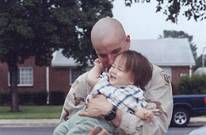|
|
||||
|
|
by Geoffrey D. Roberts  Jeremy Hinzman lacked the funds necessary for a post-secondary education. Few avenues for a career existed for him, so he enlisted in the U.S. military and felt it was a sound decision. However, as the documentary Breaking Ranks shows, Hinzman is not alone in grappling with his conscience and having difficulty with the idea he might have to kill other people in combat. Hinzman filed an application to be granted Conscientious Objector status in August of 2002. Once soldiers become recognized as conscientious objectors, they can be discharged from the military or remain and perform duties that do not require them to be part of combat because of religious, moral, or ethical objections. Because Hinzman’s initial application had been misplaced, he was forced to send another before being sent to Khandahar and given a non-combat job there while his application was being processed. At the hearing that took place in Khandahar, Hinzman indicated he had no problem with the idea of firing a weapon in self-defense. The U.S. military responded against Hinzman, stating “there is no difference between offence and defense.” Hinzman learned later on that he had to serve in Iraq. The United Nations did not support the war in Iraq. UN Secretary General Kofi Annan denounced it as illegal; therefore, Hinzman felt if he went to war in Iraq he would be involved in war-crimes and going against the Nuremberg Principals that state soldiers not only have a right but a responsibility to refuse orders that are illegal. That's why Hinzman fled to Canada with his wife and son. In Canada, he had to fill out an application for official refugee status in order to have any hope in staying in that country. Before 1976, 50,000 Americans made it across the U.S./Canadian Border to avoid military duty and were able to apply for landed immigrant status then. But in 1976 a new Immigration Act was introduced, one requiring people to file for official refugee status and to prove that they would be persecuted if sent back to their country of origin. Joshua Key decided to desert the war in Iraq after supposedly encountering two American soldiers playing soccer and using the head of a dead Iraqi. Prior to the incident, Key had been part of an infantry that raided over 100 homes where men over the age of 16 were forced from their homes and taken to prisons where they were interrogated. Key never encountered terror suspects or evidence that would necessitate the raids. While on leave for Christmas in 2003, Key left the war in Iraq to lay low with his wife and three children, moving from hotel to hotel for 14 months and seeking work as a welder. When his wife discovered she was pregnant, Key learned of the Canadian War Resisters Support Campaign from the Internet. After making the move to Canada, Key was diagnosed with Post Traumatic Stress Disorder. To make matters worse, his mother is terminally ill and he cannot enter the U.S. without facing immediate imprisonment. Brandon Hughey enlisted in the U.S. Army when a recruiter told him over the phone that his college education would be paid for after serving a year and that he could receive up to $20,000 just for enlisting. Signing up seemed a good decision because Hughey would not be able to attend college otherwise, due to his father being in debt. Hughey’s Armored Cavalry unit was to be deployed in Iraq. This soldier wanted to be discharged but was told not to think so much and to fight whether he liked it or not. Hughey fled to Canada on the evening prior to his unit being sent to Iraq. The moment Kyle Snyder exited the stage with his high school diploma in hand at graduation, he was met by an army recruiter. The recruiter lied to him by saying he would never face combat but would learn road construction instead. Snyder enlisted and found himself in Iraq. After witnessing an execution at Mosul City Hall, he fled to Canada when on a two week leave. In her moving documentary, writer/director Michelle Mason adopts a careful approach to telling the stories of these men and does not take sides or inject her own beliefs or opinions. Instead, she is content to let viewers develop their own opinions by hearing the men’s stories from their perspectives. Breaking Ranks is an insightful, intelligent, well-executed film with the ability to change people’s minds and challenge core beliefs. Breaking Ranks has its World Premiere at the Montreal World Film Festival on August 30, 2006, with an additional screening on September 1. For more information, visit the festival site at http://www.ffm-montreal.org/en_index.html or the film's official site at http://www.breakingranksthefilm.com. (Released by Screen Siren Pictures; not rated by MPAA.) |
||
|
© 2026 - ReelTalk Movie Reviews Website designed by Dot Pitch Studios, LLC |



